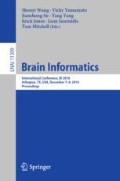Abstract
This work presents an assistive system for child with autism spectrum disorder (C-ASD). The main objective of this system is to reduce dependency on the caregiver and parent and thereby assisting them to make independent. Fuzzy logic based expert system is designed for the assisting system which will help in intervention strategies. The system collects data from four different sensors, such as GPS, heart beat, accelerometer and sound, and generates required notification for the parent, caregiver and C-ASD. The wearables-specifically smart watches- can be used to implement such system. A case study shows the proposed expert system is able to help the C-ASD to restore dysfunction.
Access this chapter
Tax calculation will be finalised at checkout
Purchases are for personal use only
References
Ahmed, I.U., Hassan, N., Rashid, H.: Solar powered smart wearable health monitoring and tracking device based on GPS and GSM technology for children with autism. In: Proceedings of ICAEE, pp. 111–116 (2017)
Alwakeel, S., Alhalabi, B., Aggoune, H., Alwakeel, M.: A machine learning based WSN system for autism activity recognition. In: Proceedings of ICMLA, pp. 771–776 (2015)
Goel, I., Kumar, D.: Design and implementation of android based wearable smart locator band for people with autism, dementia, and alzheimer. Adv. Electr. 2015, 1–8 (2015)
Kaiser, M.S., et al.: A neuro-fuzzy control system based on feature extraction of surface electromyogram signal for solar-powered wheelchair. Cogn. Comput. 8(5), 946–954 (2016)
Mahmud, M., et al.: Applications of deep learning and reinforcement learning to biological data. IEEE Trans. Neural Netw. Learn. Syst. 29(6), 2063–2079 (2018)
Mahmud, M., et al.: A brain-inspired trust management model to assure security in a cloud based IoT framework for neuroscience applications. https://doi.org/10.1007/s12559-018-9543-3. [ePub ahead of print]
Min, C.: Automatic detection and labeling of self-stimulatory behavioral patterns in children with autism. In: Proceedings of IEEE-EMBC, pp. 279–282 (2017)
Min, C.H., Tewfik, A.: Automatic characterization and detection of behavioral patterns using linear predictive coding of accelerometer sensor data. In: Proceedings of IEEE-EMBC, pp. 220–2233 (2010)
Santos, B.R., et al.: A method for automatic fuzzy set generation using sensor data. Intell. Autom. Soft Comput. 14(3), 279–294 (2008)
Sula, A., Spaho, E.: Using assistive technologies in autism care centers to support children develop communication and language skills. A case study: Albania. Acad. J. Interdiscip. Stud. 3(1), 203–212 (2014)
Author information
Authors and Affiliations
Corresponding authors
Editor information
Editors and Affiliations
Rights and permissions
Copyright information
© 2018 Springer Nature Switzerland AG
About this paper
Cite this paper
Sumi, A.I., Zohora, M.F., Mahjabeen, M., Faria, T.J., Mahmud, M., Kaiser, M.S. (2018). fASSERT: A Fuzzy Assistive System for Children with Autism Using Internet of Things. In: Wang, S., et al. Brain Informatics. BI 2018. Lecture Notes in Computer Science(), vol 11309. Springer, Cham. https://doi.org/10.1007/978-3-030-05587-5_38
Download citation
DOI: https://doi.org/10.1007/978-3-030-05587-5_38
Published:
Publisher Name: Springer, Cham
Print ISBN: 978-3-030-05586-8
Online ISBN: 978-3-030-05587-5
eBook Packages: Computer ScienceComputer Science (R0)

